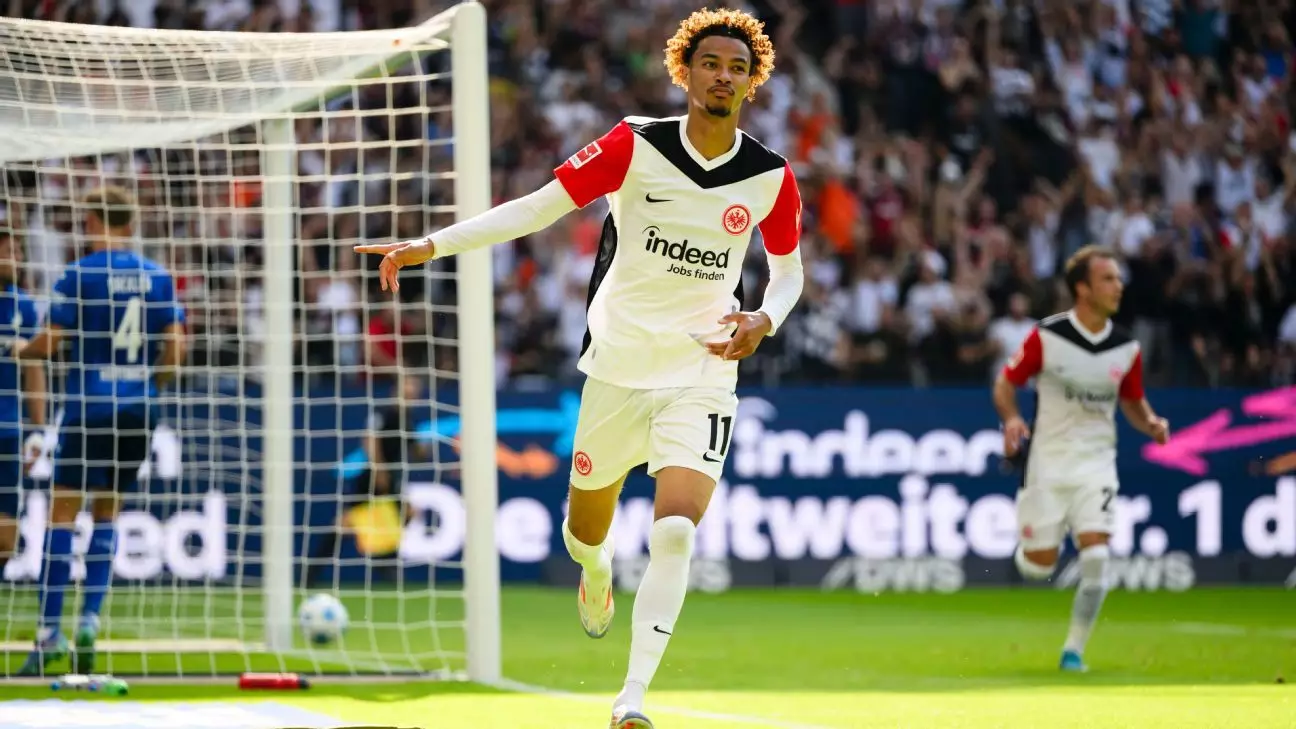In the ever-evolving landscape of football transfers, Arsenal’s strategic eye has recently turned to Eintracht Frankfurt striker Hugo Ekitike. The Gunners are reportedly considering the 22-year-old forward as a viable alternative to their primary target, Newcastle’s Alexander Isak. This is not merely an exercise in expanding their options; it reflects a thoughtful approach to a competitive market. Ekitike, with an impressive tally of 19 goals and eight assists in 38 matches this season, has recently rekindled his form after a lukewarm period at Paris Saint-Germain. The crux of Arsenal’s interest lies not just in Ekitike’s performance stats but in understanding the financial implications of signing him.
While Newcastle has set a staggering £150m price tag on Isak, Arsenal’s willingness to consider Ekitike, with a projected transfer fee around £60m, indicates a practical realism and an astute focus on value for money. This move illustrates a broader trend in football—clubs increasingly prioritize not just marquee names but players who can be nurtured into superstars. Ekitike represents a blend of potential and proven capability, suggesting that Arsenal are not merely looking for immediate impact but also planning for long-term success.
Real Madrid’s Ambitions: A Midfield Overhaul
Over at Real Madrid, the hunt for midfield reinforcements has led to a strong interest in Martín Zubimendi of Real Sociedad. The 26-year-old has shown great promise and is seen by the Santiago Bernabéu hierarchy as the answer to their midfield conundrum. With a rumoured offer of €60m on the table, Madrid’s approach showcases a blend of urgency and determination to maintain their status at the pinnacle of European football. Zubimendi’s decision to spurn a previous opportunity to join Liverpool underscores his strategic decision-making and preference for situations where he can flourish, which Madrid surely offers.
It’s clear that clubs like Real Madrid are not just looking for immediate gratification in potential signings; they are also aware of the need for players who can adapt seamlessly into their system. Zubimendi, being a product of the Sociedad academy, exemplifies homegrown potential and tactical awareness, two qualities that Madrid may find invaluable as they aim to evolve in the face of intense competition from domestic and European fronts.
Newcastle’s Ambitious Defensive Strategies
As Newcastle United seeks to solidify their defense, the club has identified Liverpool’s Jarell Quansah as a target. Reports suggest that the Magpies are preparing a £30m offer for the 22-year-old centre-back, who has begun making a name for himself in the Premier League. He has showcased versatility by playing effectively as a right-back amid injuries to more established players. This adaptability is a significant asset; Newcastle’s approach reflects an understanding of the modern game that values flexibility in player roles.
By prioritizing younger, more adaptable players like Quansah, Newcastle is not simply replacing players but building a robust squad capable of competing at the highest levels. This strategy not only aligns with their ambitions but also demonstrates a forward-thinking mentality that could see them emerge as serious contenders, suggesting that the club’s hierarchy is committed to creating a legacy, not just a fleeting moment of success.
Market Dynamics: High Valuations and Tactical Implications
The transfer narrative often circles around inflated valuations, and AFC Bournemouth’s Antoine Semenyo is a clear example of this trend. With a valuation of £70m, Bournemouth is strategically pricing him out of the market, possibly as a defensive maneuver against interest from Newcastle. The club understands that players of Semenyo’s caliber have the potential to transform teams, and they are leveraging that value to negotiate from a position of strength.
This tactic of setting high price points can often backfire, though, as clubs might turn their attentions elsewhere. Nevertheless, it reveals a crucial aspect of modern football—the finagling of negotiations has become as integral to the transfer process as the performances on the pitch. Clubs now engage in a game of chess, making calculated decisions on when to hold firm and when to reassess.
The Broader Implications of Transfer Strategies
In a broader context, the transfer marketplace is becoming increasingly competitive, with clubs like Juventus contemplating financial sacrifices by potentially offloading Andrea Cambiaso amidst interest from powerhouses like Manchester City and Liverpool. The pressure of maintaining financial health while striving for competitive superiority is ever-present, and clubs must navigate these waters carefully.
With rampant speculation surrounding young talents such as Southampton’s Tyler Dibling and emerging players from across Europe, including standout youngsters like Konstantinos Karetsas from Genk, the market is teeming with opportunities and rivalries. Clubs that exploit these effectively will not only enhance their squads but also lay foundations for sustained success.
As Arsenal seeks out Ekitike and Real Madrid covets Zubimendi, the dynamics of football transfers continue to shift, reflecting a game that is as much about economic acumen as it is about matchday performance.
